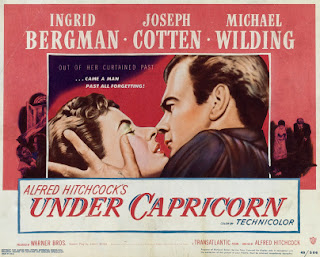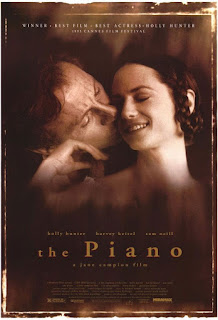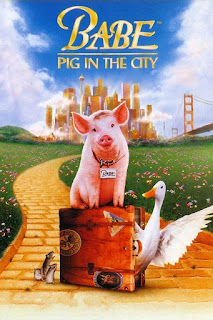December 5th: UNDER CAPRICORN (Alfred Hitchcock, 1949)
NOTE: This film will be projected in the high-definition Blu-ray format.
In 1830s Sydney, Australia, an enterprising young man new in town comes into contact with a husband and wife who are guarding dark family secrets.
Alfred Hitchcock arrived in Hollywood with a considerable pedigree already under his belt from his 10+ years of directing films in Britain. Under contract to producer David O. Selznick, he struck gold right off the bat, with his American debut Rebecca winning the Oscar for Best Picture. More successful productions followed, usually with some of cinema's biggest stars, including Suspicion, Notorious, Foreign Correspondent, Saboteur, and Notorious.
Eventually, Hitchcock gained more control over his projects, experimenting with subject matter, form, and technique; his 1944 film Lifeboat was totally confined to the space of its title vessel. His short-lived independent production company led him to make his first film in color: Rope, which was shot in long takes with its few cuts disguised to make it look like the entire story was shot at once, in real time. It was followed by a rare period piece, Under Capricorn, based on a novel by Australian writer Helen Simpson (whose work Hitchcock had previously adapted), with a screenplay co-written by Hume Cronyn (an actor in Hitchcock's Shadow of a Doubt).
Shooting took place both in Los Angeles at the Warner Ranch and at MGM's UK studios. Behind the camera was the innovative cinematographer Jack Cardiff, former collaborator of Powell & Pressburger, including his Oscar-winning work on their film The Red Shoes. Working again in color, Hitchcock would continue to experiment with the long take, and with more elaborate dolly and crane shots.
The casting reunited Hitchcock with Ingrid Bergman (her third film with the director) and Joseph Cotten (Shadow of a Doubt, Citizen Kane), joined by British actors Michael Wilding, Margaret Leighton, and Cecil Parker (Hitchcock's The Lady Vanishes), and Irish actor Denis O'Dea (John Ford's The Informer).
Ingrid Bergman, already an Oscar winner, was given another complex character to play (as in Hitchcock's Notorious), and has a memorable, lengthy monologue that focuses completely on her performance. It was during this production that Bergman began an extramarital affair with Italian director Roberto Rossellini.
The distributing studio mismarketed Under Capricorn as a typical Hitchcock thriller, instead of correctly advertising it as a gothic drama. American critics and audiences were not pleased with this change of pace from the director, and it would mark Hitchcock's third box office failure in a row. However, in France, critics for film magazine Cahiers du Cinema who would become the pioneering directors of the French New Wave (Jacques Rivette, Claude Chabrol, Eric Rohmer) wrote positively about it, considering it one of his best works.
Running time is 2 hours.
In 1830s Sydney, Australia, an enterprising young man new in town comes into contact with a husband and wife who are guarding dark family secrets.
Alfred Hitchcock arrived in Hollywood with a considerable pedigree already under his belt from his 10+ years of directing films in Britain. Under contract to producer David O. Selznick, he struck gold right off the bat, with his American debut Rebecca winning the Oscar for Best Picture. More successful productions followed, usually with some of cinema's biggest stars, including Suspicion, Notorious, Foreign Correspondent, Saboteur, and Notorious.
Eventually, Hitchcock gained more control over his projects, experimenting with subject matter, form, and technique; his 1944 film Lifeboat was totally confined to the space of its title vessel. His short-lived independent production company led him to make his first film in color: Rope, which was shot in long takes with its few cuts disguised to make it look like the entire story was shot at once, in real time. It was followed by a rare period piece, Under Capricorn, based on a novel by Australian writer Helen Simpson (whose work Hitchcock had previously adapted), with a screenplay co-written by Hume Cronyn (an actor in Hitchcock's Shadow of a Doubt).
Shooting took place both in Los Angeles at the Warner Ranch and at MGM's UK studios. Behind the camera was the innovative cinematographer Jack Cardiff, former collaborator of Powell & Pressburger, including his Oscar-winning work on their film The Red Shoes. Working again in color, Hitchcock would continue to experiment with the long take, and with more elaborate dolly and crane shots.
The casting reunited Hitchcock with Ingrid Bergman (her third film with the director) and Joseph Cotten (Shadow of a Doubt, Citizen Kane), joined by British actors Michael Wilding, Margaret Leighton, and Cecil Parker (Hitchcock's The Lady Vanishes), and Irish actor Denis O'Dea (John Ford's The Informer).
Ingrid Bergman, already an Oscar winner, was given another complex character to play (as in Hitchcock's Notorious), and has a memorable, lengthy monologue that focuses completely on her performance. It was during this production that Bergman began an extramarital affair with Italian director Roberto Rossellini.
The distributing studio mismarketed Under Capricorn as a typical Hitchcock thriller, instead of correctly advertising it as a gothic drama. American critics and audiences were not pleased with this change of pace from the director, and it would mark Hitchcock's third box office failure in a row. However, in France, critics for film magazine Cahiers du Cinema who would become the pioneering directors of the French New Wave (Jacques Rivette, Claude Chabrol, Eric Rohmer) wrote positively about it, considering it one of his best works.
Running time is 2 hours.










Comments
Post a Comment